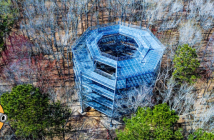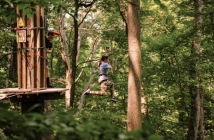Once the initial quarantine lifted last summer, so did our collective cabin fever, and Zoom-weary Americans started exploring the great outdoors in record numbers. This was good news for adventure parks that were able to open, even with reduced capacities and Covid safety protocols in place. While some of these new operational changes were limiting, one of those that emerged as a lasting improvement was contactless transactions.
A contactless transaction can be high tech—online booking, digital waiver, tap to pay, wearable media—or low tech, such as a telephone booking. All were available and used to varying degrees at adventure parks pre-pandemic, of course. But to combat the spread of Covid cooties, contactless options became much more commonplace.
Utilizing available technology, especially, that allows for touch-free transactions is beneficial in several other ways, too. Done well, it can streamline the guest experience, streamline operations, and increase revenue.
The adventure park industry has maintained a unique foothold in the outdoor economy, and many properties unexpectedly enjoyed a banner year in 2020. After all, the core business model requires paying customers to remain outside throughout (most of) their visit, which is organically conducive to recommended social distancing guidelines. All it takes for the optimum guest experience, then, is the proper software, messaging, and highly flexible staff.
Here to Stay
“Contactless transactions are here to stay,” says Checkfront senior director of operations Stephanie Brachat. “In 2021, we will see increasing consumer expectations for every piece of the guest journey to be contactless. It’s no longer just contactless payments, but now bookings, signing waivers, check-in, and beyond. The shift may have come from the need to overcome the challenges of Covid-19, but this change in consumer behavior will be our new normal moving forward.”
Brachat isn’t alone in that belief. “We predict that consumers will continue to prefer online bookings moving forward, and the [demand for]online booking platforms will continue to increase,” says Adventure Office marketing and sales staffer Liz Kratz. “Having software that can handle your business in its entirety will be key to thriving in the future.”
Flagstaff Extreme, which has adventure park locations in Arizona, Florida, and a new park in New Jersey, exemplifies the shift. Flagstaff has always aimed to minimize guests’ transactional time in order to “maximize fun time,” says owner Paul Kent. In 2020, the company began requiring advance reservations online or by phone, and it only accepts credit cards or touchless payment on site. “We have been working toward contactless transactions for years, so Covid has actually helped the process along,” says Kent.
A better guest experience. As adventure parks adjusted to safety guidelines that will likely remain for at least some of this summer (depending on the state or province), an unexpected trend continues to ripple across the industry: the guest experience is getting better overall. Much better, in fact, thanks in part to smaller crowds and more start time options.
It helps that guests have adapted, too. Most are willing to abide by social distancing rules, which allows park operators to spend less time policing guest behavior and more time enhancing their aerial adventures.
Brachat sees an excellent synergy between this trending behavior and the implementation of contactless pay. “Speeding up transactions means that you serve customers quicker, especially during peak hours,” she says. “This results in a better customer experience, and allows operators to devote their human resources to other areas of the business.”
What’s more, consumers have already embraced the exclusivity factor of socially distant activities. “Guests are willing to make advance reservations—and pay extra for them—in order to get this premium experience,” says The Flybook co-founder Megan Langer. “When capacity restrictions lift, this might continue in the form of an upsell during times when capacity is limited. Disney’s Magic Hour has mastered this strategy. Or guests could buy a specific VIP timeframe for popular adventure park attractions.”
Contactless Pay
“‘Contactless pay’ is the newest buzzword, thanks to Covid, and rightly so,” says Langer. “There are two main ideas when it comes to contactless pay. First, there is the actual payment process [i.e., tapping a card to a terminal rather than requiring guests to touch it]. Second is the concept of removing a credit card altogether and instead storing it on a wristband to be scanned throughout your location or experience.”
Done well, it can streamline the guest experience, streamline operations, and increase revenue.
The future is now. The Flybook is one of many booking and management software companies to offer contactless pay, which can be as profitable as it is practical. And while such tech used to be accessible only to large-scale theme parks (think Six Flags and Disney), it’s destined to become the new standard for mid-sized properties, and sooner than you might think.
Plus, Brachat reminds us that it’s all about the younger generation. “For [Gen Z], it’s much more natural to pull out a phone than a wallet,” she notes.
Indeed, The Flybook has several clients who already plan on implementing contactless pay into their existing booking software, and Langer anticipates the demand for such technology to mushroom in coming years. “This is a very new feature in The Flybook—one we recognized as an important feature during Covid,” she says. “While our entire industry was shut down, we got to work on this feature to be ready for reopening.”
Cashless. At Flagstaff Extreme locations, going contactless includes no longer taking cash. Kent says it’s been an easy transition, but admits he isn’t sure if they’re leaving money on the table, so to speak. “We’ve had no pushback from guests, but we don’t know what sales would have been if we also took cash,” he says.
Another consideration: once it’s safe for youth groups to return, those kids don’t carry credit cards. “I’m concerned about youth groups [post Covid], since most group kids buy their snacks and merchandise with cash.”
Upsell Opportunities
According to Langer, the hidden value of contactless pay for adventure park operators is how easy it makes upselling. “Contactless pay allows guests to decide—while they’re already enjoying a given experience—to do more and spend more,” she says. “If they jump off the freefall or take a turn on the zip line, contactless pay allows them to make that decision, in real time, to immediately take another turn.”
This organic opportunity to upsell is key. “Can your guests purchase food or drink onsite? Do you have multiple elements that people might want to experience more of? If the answer to either of these questions is ‘yes,’ there’s a great argument to implement contactless pay,” says Langer.
For example, an adventure park might sell a three-hour ticket that also includes one jump off the freefall, or one ride on the zip line or giant swing. “People often love these features, and would purchase an extra if it were easy,” says Langer. “Contactless pay removes almost all layers of friction from your guests’ desire to do more with you,” a benefit not only for revenue, but for the guest experience, she adds.
Add-on sales. Flagstaff Extreme has found opportunities, as others have, to upsell during the booking process. Using Rezdy booking software, the parks added options to the purchase flow. “We added the ability to pre-buy our gloves, water, and mini carabiner package,” says Kent. “We also added our branded face masks, since we require masks for check in and any time we’re close together. We’ve seen good uptake of these add-on sales.”
Kent says they also added a “voluntary Covid contribution to our checkout process—if our guests wanted to help offset the extra costs incurred or the reduction in profitability. We did not want to raise prices or make it a mandatory thing, but people have been good to us and participate.”
Low(ish)-Tech Touchless
While many adventure operations will gladly push guests to book online, phone bookings won’t just stop happening. Many guests still prefer to call.
According to the 2021 Adventure Park Insider State of the Industry Report, 26 percent of bookings were made via phone or email in 2020—second only behind bookings made via company website or app (50 percent). That’s not much changed from the 2020 Report, which showed a majority of bookings in the pre-Covid 2019 season were made by phone or email for traditional operations (43 percent); recreational operators reported 25 percent of bookings came via phone or email, the third most common method behind company website (36 percent) and in person (28 percent).
This underscores the importance of training staff who answer the phone to be knowledgeable and guest service-savvy. As this magazine’s Park Spy has revealed many times over, this sort of training does not appear to be a priority for some operations—a shortcoming that likely loses bookings for them.
Email and text messaging are becoming popular modes of communication for guests to use—and for adventure parks to utilize—especially for a younger generation that prefers text over talking.
In response to this diversity of booking modes, Flagstaff Extreme uses all forms of communication. “We try to continuously reduce the need for calls—we really encourage and respond quickest to emails and texts,” says Kent.
The hidden value of contactless pay for adventure park operators is how easy it makes upselling.
Still, phone callers get the attention they need. “The team that handles calls works remotely,” Kent says. “This allows them to focus 100 percent on the guests’ calls without being distracted by course activity. These staff have all been a customer-facing person for us at some point, so they understand what we do and how we do it.”
Like many industries, the adventure park world is moving toward contactless transactions to make the purchasing experience as friction-free as possible. And that’s a win-win for both guests and staff.






